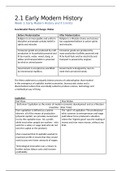Summary
Early Modern History Summary - Erasmus University HISTORY YR1
- Course
- Institution
- Book
Early Modern History Summary () Erasmus University IB History, year 1 All the notes from lectures, literature, and tutorials combined. All the key concept and learning objectives are included in the summary.
[Show more]




